Unit 13 We're trying to save the earth! 同步讲义及练习2021-2022学年人教版英语九年级
文档属性
| 名称 | Unit 13 We're trying to save the earth! 同步讲义及练习2021-2022学年人教版英语九年级 | 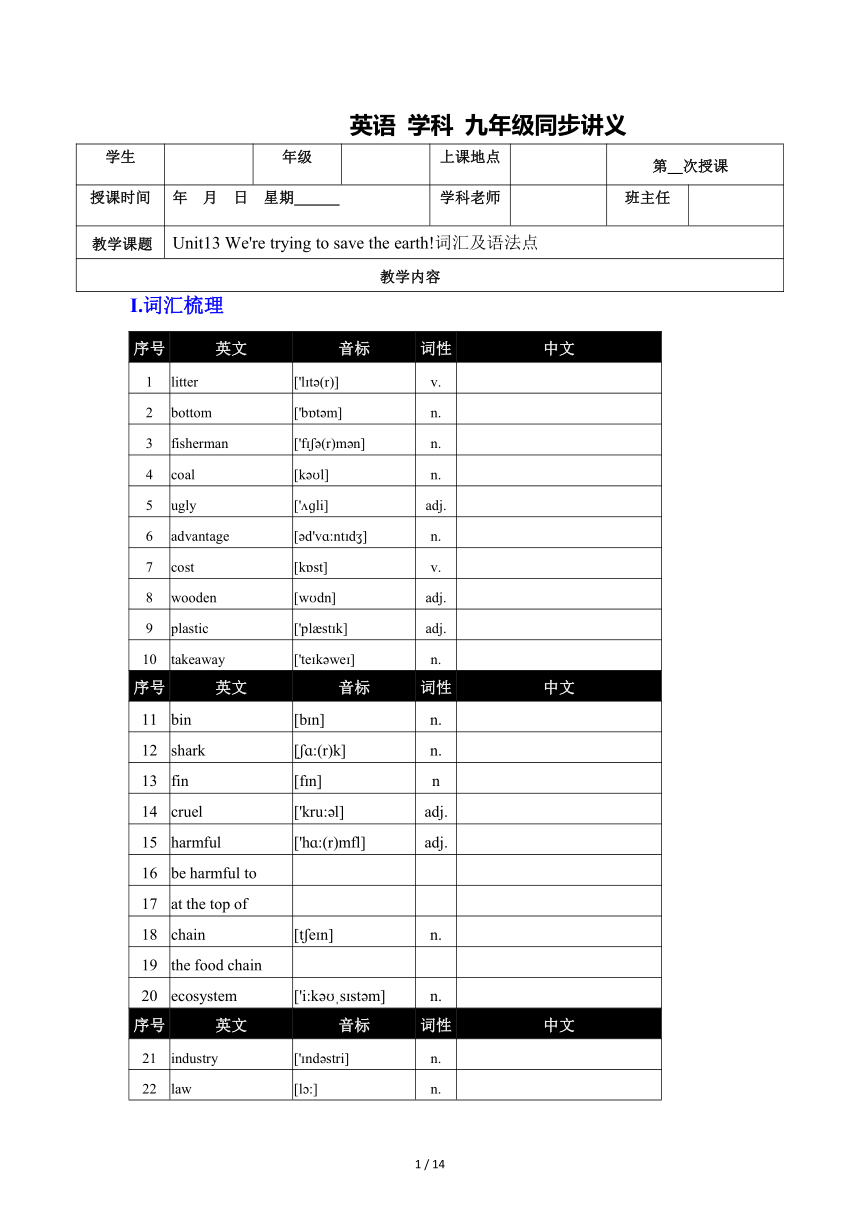 | |
| 格式 | docx | ||
| 文件大小 | 2.8MB | ||
| 资源类型 | 教案 | ||
| 版本资源 | 人教新目标(Go for it)版 | ||
| 科目 | 英语 | ||
| 更新时间 | 2022-01-02 19:21:35 | ||
图片预览

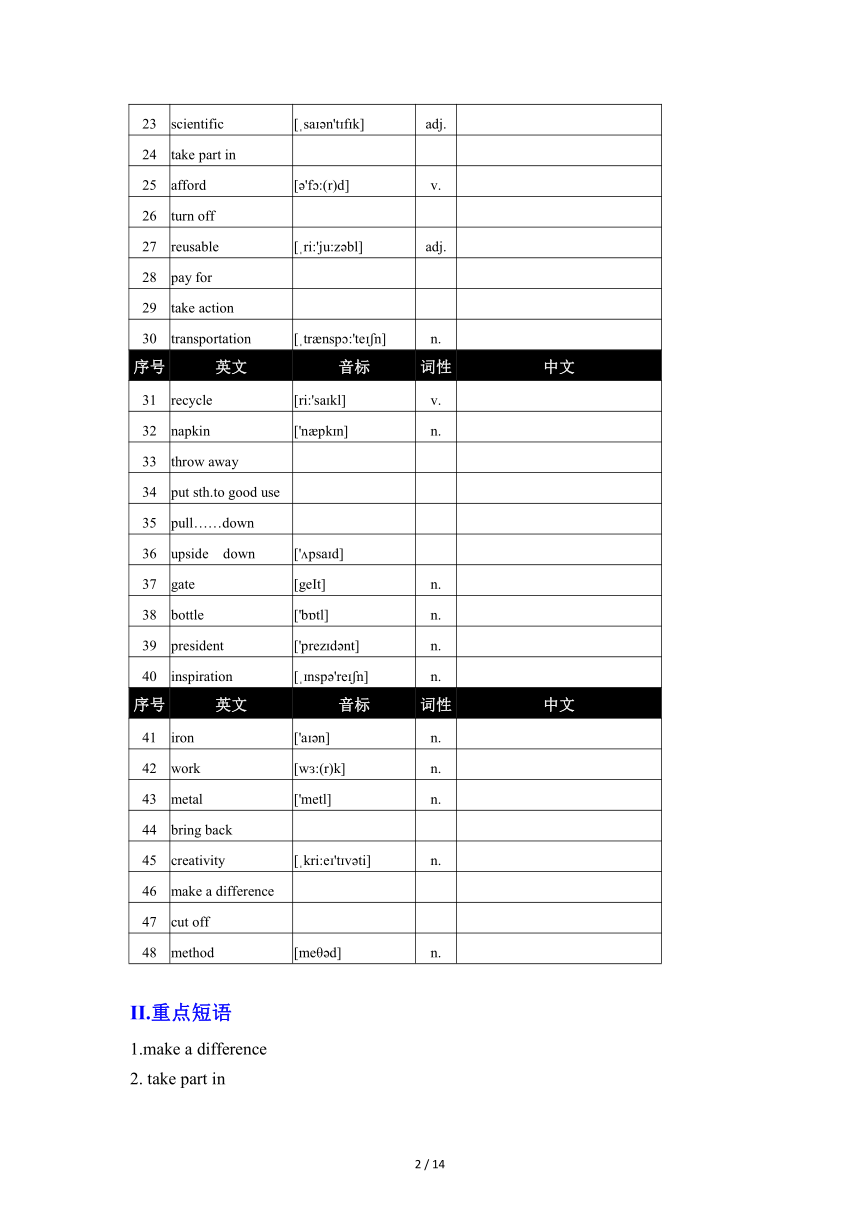
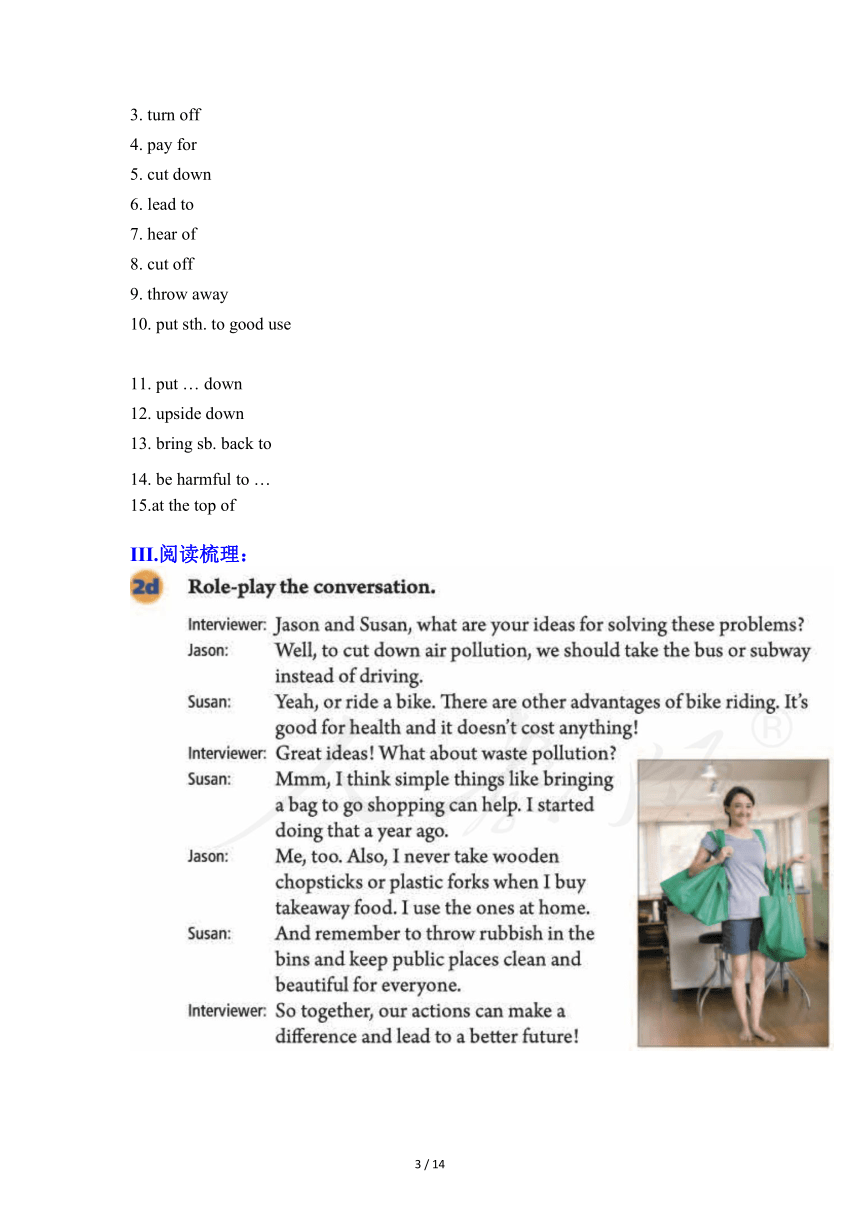
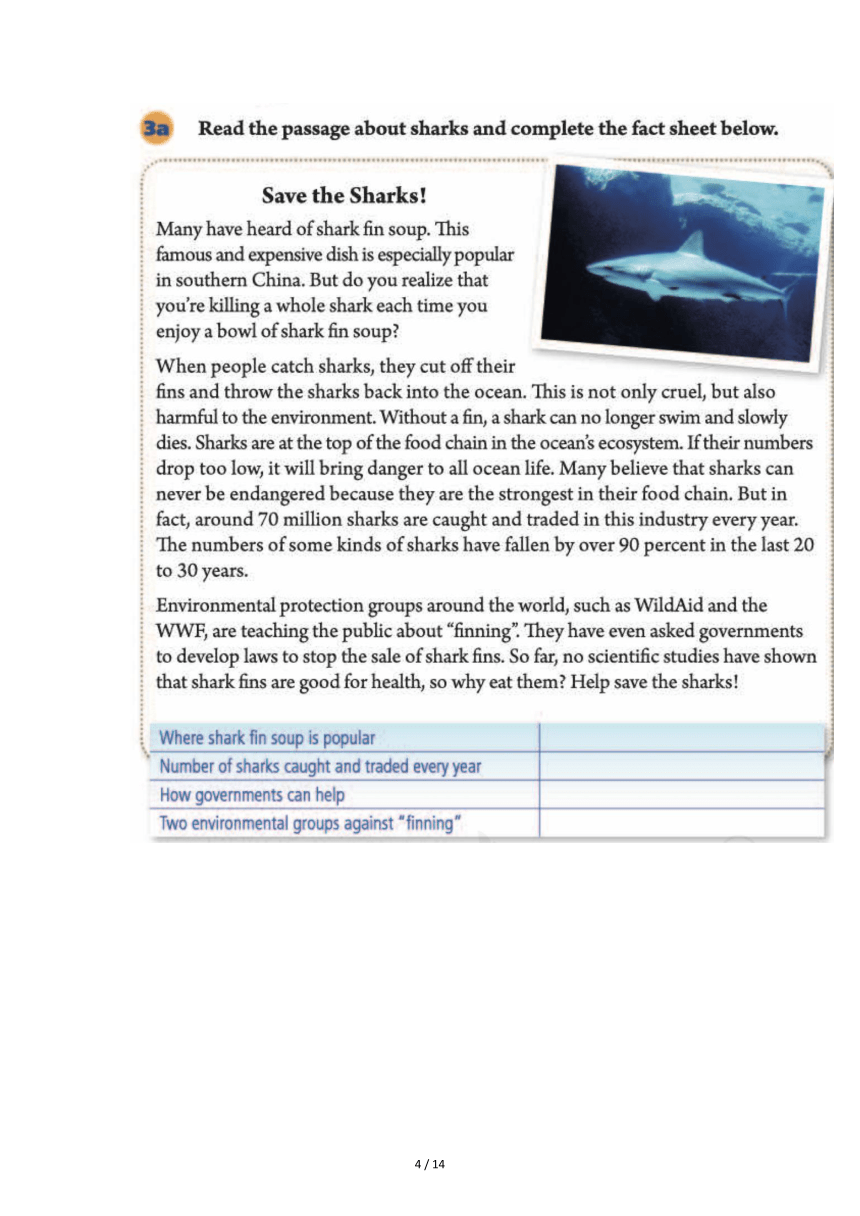
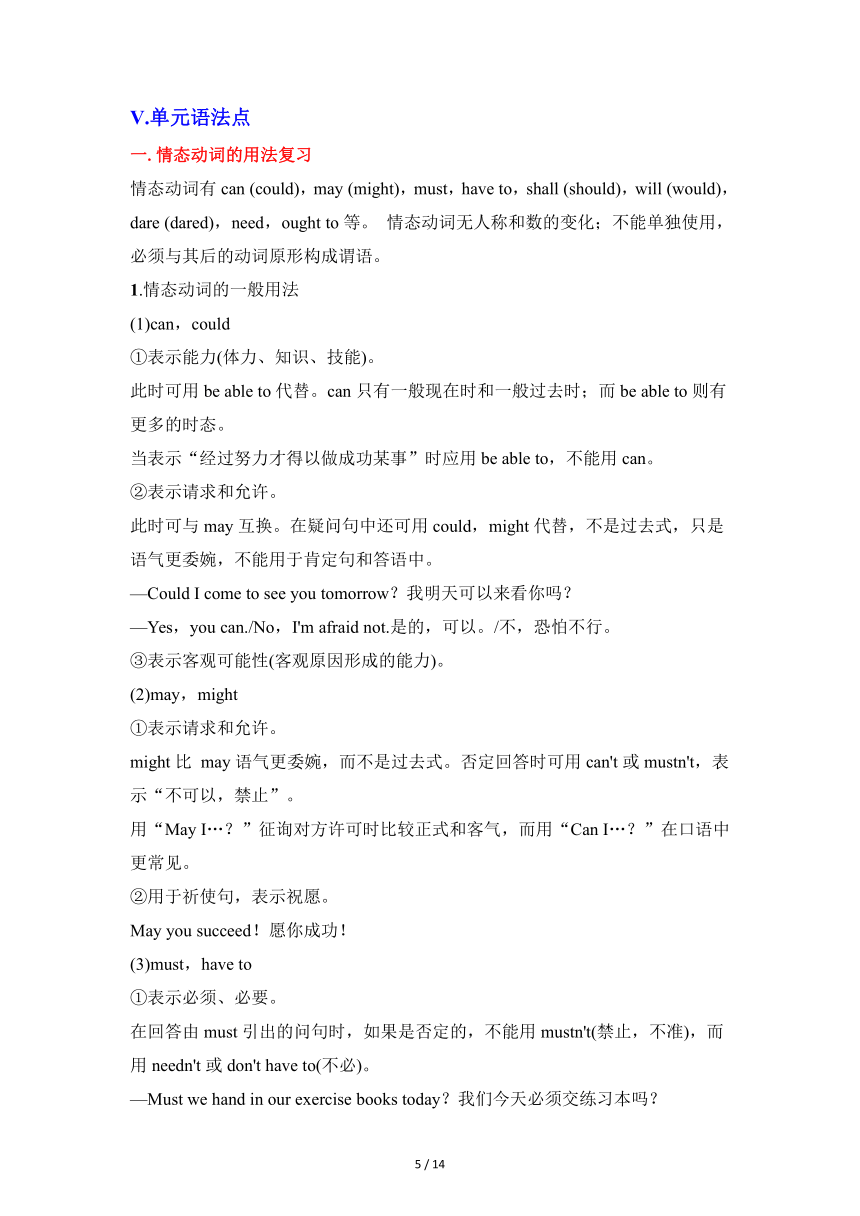
文档简介
英语 学科 九年级同步讲义
学生 年级 上课地点 第 次授课
授课时间 年 月 日 星期 学科老师 班主任
教学课题 Unit13 We're trying to save the earth!词汇及语法点
教学内容
I.词汇梳理
序号 英文 音标 词性 中文
1 litter ['l t (r)] v.
2 bottom ['b t m] n.
3 fisherman ['f (r)m n] n.
4 coal [k l] n.
5 ugly [' ɡli] adj.
6 advantage [ d'vɑ:nt d ] n.
7 cost [k st] v.
8 wooden [w dn] adj.
9 plastic ['pl st k] adj.
10 takeaway ['te k we ] n.
序号 英文 音标 词性 中文
11 bin [b n] n.
12 shark [ ɑ:(r)k] n.
13 fin [f n] n
14 cruel ['kru: l] adj.
15 harmful ['hɑ:(r)mfl] adj.
16 be harmful to
17 at the top of
18 chain [t e n] n.
19 the food chain
20 ecosystem ['i:k s st m] n.
序号 英文 音标 词性 中文
21 industry [' nd stri] n.
22 law [l :] n.
23 scientific [ sa n't f k] adj.
24 take part in
25 afford [ 'f :(r)d] v.
26 turn off
27 reusable [ ri:'ju:z bl] adj.
28 pay for
29 take action
30 transportation [ tr nsp :'te n] n.
序号 英文 音标 词性 中文
31 recycle [ri:'sa kl] v.
32 napkin ['n pk n] n.
33 throw away
34 put sth.to good use
35 pull……down
36 upside down [' psa d]
37 gate [geIt] n.
38 bottle ['b tl] n.
39 president ['prez d nt] n.
40 inspiration [ nsp 're n] n.
序号 英文 音标 词性 中文
41 iron ['a n] n.
42 work [w :(r)k] n.
43 metal ['metl] n.
44 bring back
45 creativity [ kri:e 't v ti] n.
46 make a difference
47 cut off
48 method [meθ d] n.
II.重点短语
1.make a difference
2. take part in
3. turn off
4. pay for
5. cut down
6. lead to
7. hear of
8. cut off
9. throw away
10. put sth. to good use
11. put … down
12. upside down
13. bring sb. back to
14. be harmful to …
15.at the top of
III.阅读梳理:
V.单元语法点
一.情态动词的用法复习
情态动词有can (could),may (might),must,have to,shall (should),will (would),dare (dared),need,ought to等。 情态动词无人称和数的变化;不能单独使用,必须与其后的动词原形构成谓语。
1.情态动词的一般用法
(1)can,could
①表示能力(体力、知识、技能)。
此时可用be able to代替。can只有一般现在时和一般过去时;而be able to则有更多的时态。
当表示“经过努力才得以做成功某事”时应用be able to,不能用can。
②表示请求和允许。
此时可与may互换。在疑问句中还可用could,might代替,不是过去式,只是语气更委婉,不能用于肯定句和答语中。
—Could I come to see you tomorrow?我明天可以来看你吗?
—Yes,you can./No,I'm afraid not.是的,可以。/不,恐怕不行。
③表示客观可能性(客观原因形成的能力)。
(2)may,might
①表示请求和允许。
might比 may语气更委婉,而不是过去式。否定回答时可用can't或mustn't,表示“不可以,禁止”。
用“May I…?”征询对方许可时比较正式和客气,而用“Can I…?”在口语中更常见。
②用于祈使句,表示祝愿。
May you succeed!愿你成功!
(3)must,have to
①表示必须、必要。
在回答由must引出的问句时,如果是否定的,不能用mustn't(禁止,不准),而用needn't或don't have to(不必)。
—Must we hand in our exercise books today?我们今天必须交练习本吗?
—Yes,you must. (No,you don't have to/you needn't.)是的,你们必须今天交。(不,你们不一定要今天交。)
②must是说话人的主观看法,而have to则强调客观需要。must只有一般现在时,而have to 有更多的时态形式。
I had to work when I was your age.我像你这么大时,就必须工作了。
(4)dare,need
①dare作情态动词用时,常用于疑问句、否定句和条件从句中,其过去式为dared。
He daren't speak English before such a crowd,dare he?他不敢在人群前说英语,是吗?
②need 作情态动词用时,常用于疑问句、否定句。在肯定句中一般用must,have to,ought to,should代替。
—Need I finish the work today?我需要今天完成这个工作吗?
—Yes,you must./No,you needn't.是的,必须今天完成。/不,不一定要今天完成。
③dare和 need作实义动词用时,有人称、时态和数的变化。在肯定句中,dare后面常接带to的不定式。在疑问句和否定句中,dare后面可接带to或不带to的不定式。而need后面只能接带to的不定式。
He doesn't dare (to) answer.他不敢回答。
He needs to finish his homework today.他今天要完成家庭作业。
(5)shall,should
①shall 用于第一人称,征求对方的意见。
What shall we do this evening?今天晚上我们做什么?
②shall 用于第二、三人称,表示说话人给对方的命令、警告、允诺或威胁。
You shall fail if you don't work hard.如果你不努力就会失败。(警告)
(6)will,would
①表示请求、建议等,would更委婉。
Will/Would you pass me the ball, please 你能把那个球递给我吗?
②表示意志、愿望和决心。
I will never do that again.我再不会那样做了。
③would表示过去反复发生的动作或某种倾向。would表示过去的习惯时比used to正式,且没有“现已无此习惯”的含义。
During the vacation,he would visit me every other day.假期里,他每隔一天看我一次。
(7)should,ought to
①should,ought to表示“应该”,ought to表示义务或责任,比should语气重。
I should help her because she is in trouble.我应该帮她,因为她陷入麻烦了。
You ought to take care of the baby.你应该照顾这个宝宝。
②表示劝告、建议和命令时should,ought to可通用,但在疑问句中常用should。
You should/ought to go to class right away.你应该马上去上课。
Should I open the window?我应该打开门吗?
2.情态动词表推测
(1)can表示推测(惊讶、怀疑、不相信的态度),用于疑问句、否定句和感叹句中。
Can this be true?这可能是真的吗?
This can't be done by him.这不可能是他做的。
How can this be true?这怎么可能是真的?
(2)may/might表示推测、可能性(不用于疑问句)。might不是过去式,它所表示的可能性比may小。
Your mother may/might not know the truth.你妈妈可能不知道真相。
(3)must表示推测、可能性(只用于肯定的陈述句)。
You're Tom's good friend,so you must know what he likes best.你是汤姆的好朋友,你一定知道他最喜欢什么。
(4)should,ought to (客观推测),must(主观推测)。
He must be home by now.他现在一定回家了。(断定他已到家)
He ought to/should be home by now.他现在应该到家了。(按理应当,不太肯定)
二.used to “闯三关”
1.用法关
used to后接动词原形,表示过去经常性或持续性的动作或状态,意为“过去常常”。
I used to get up very early.我过去常常很早起床。
When I was young,it used to be very cold in winter.我小的时候,冬天经常很冷。
2.句式关
其否定形式为“didn't use to do sth.”或“usedn't to do sth.”;一般疑问形式为“Used sb.to do sth. ”或“Did sb.use to do sth. ”;附加疑问句式为“use(d)n't sb.”或“didn't sb.”。
3.辨异关
be/get used to后面接名词或动词-ing形式时,表示“习惯于做某事”,其中to为介词;be used to后面接动词原形时,表示“被用来做某事”。其中to是不定式符号。
I'm used to walking to school now.我现在习惯步行去学校。
The computer is used to store information.这台电脑被用来储存信息。
【课堂测评】
一.重点短语:
1.起作用;有影响 2.参加
3.关掉 4.付费;付出代价
5. 减少 6.导致
7.听说 8.切除
9. 扔掉 10. 好好利用
11.拆下;摧毁 12.上下颠倒
13. 使想起 14. …对…有害
15.在…顶部或顶端 16.采取行动
二.单选练习:
( )1.I don’t like loud music, she doesn’t like it .
A. too B. also C. neither D. either
( )2.Sometimes the ad can lead you to buy something you don’t need .
A. at tall B. at all C. at first D. after all
( )3.They all me good luck in the school trip.
A. hope B. want C. wish D. like
( )4. The waiter in the restaurant wine to us.
A. provided B. poured C. added D. served
( )5.In the exam, the you are, the mistakes you’ll make .
A. careful ; little B. more careful ; less C. more careful ; few D . more carefully;fewer
( )6. I was annoyed my parents for leaving me at home.
A. for B. to C. with D. after
( )7.We every day when we were children.
A. used to swim B. used to swimming C. are used to swim D. are used to swimming
( )8.He watched the game with a look.
A. surprise B. surprised C. surprising D. surprise
( )9. I thought Jim would say something about his school report, but he it .
A. doesn’t mention B. hadn’t mentioned C. didn’t mention D. hasn’t mentioned
( )10.You haven’t read the notice to the audience, and .
A. either have I B. neither have I C. neither I have D. so have I
( )11.----Computer is very useful. ----Yes, with the help of computers, news can every corner of the world.
A. got B. return C. arrive D. reach
( )12.----When shall we go to the beach again --Make it day you like , it’s all the same to me .
A. one B. another C. some D. any
( )13. You play with fire , Ben .It’s dangerous .
A. needn’t B. may not C. mustn’t D. wouldn’t
( )14.The wounded to the hospital immediately by the volunteers after the earthquake.
A. took B. was taken C. were taken D. takes
( )15. --Please don’t make a noise. The baby is sleeping. -- .I’ll keep quiet.
A. Yes, I won’t B. Yes, I will C. No, I won’t D. No, OK
三.完形填空:
It was very cold that day. It was 1 heavily and the ground was covered with 2 snow. The shepherd thought it was dangerous to 3 the hill and it was difficult for the sheep to find some 4 there. So he decided to stay in the 5 room. He put some hay(干草) in a pen(围栏) 6 the sheep could eat it when they were 7 . The dog, who felt cold outside, lay on the 8 hay and soon went to sleep.
At noon the sheep wanted to eat the hay. They were 9 afraid of the dog and 10
could get close to it. At last the 11 sheep came to the hay. Before he started to eat, the dog heard it and opened his eyes. He barked(吠) loudly to 12 him. The sheep ran away13 . Looking at the unnatural(不近人情的) dog, the sheep began to talk 14 .
“What a selfish(自私的) dog!” said one of the sheep. “He cannot eat the hay, and yet refuses to 15 those who can to eat!”
( )1. A. raining B. snowing C. blowing D. shining
( )2. A. thick B. thin C. beautiful D. big
( )3. A. play on B. live on C. climb up D. go to
( )4. A. cake B. grass C. fruit D. vegetables
( )5. A. cold B. cool C. hot D. warm
( )6. A. in order to B. so as to C. so that D. in order
( )7. A. hungry B. sick C. full D. free
( )8. A. hard B. soft C. thin D. wet
( )9. A. both B. either C. all D. neither
( )10. A. none B. neither C. any D. some
( )11. A. smallest B. youngest C. weakest D. strongest
( )12. A. meet B. greet C. warn D. receive
( )13. A. easily B. happily C. sadly D. quickly
( )14. A. angrily B. happily C. quietly D. politely
( )15. A. let B. ask C. forget D. allow
【课堂测评】
一.重点短语:
1.make a difference 2. take part in
3. turn off 4. pay for
5. cut down 6. lead to
7. hear of 8. cut off
9. throw away 10. put sth. to good use
11. put … down 12. upside down
13. bring sb. back to 14. be harmful to …
15.at the top of 16.take action
二.单选练习:
01-05 DBCDD
06-10 CACCB
11 -15 DDCCB
三.完形填空:
01-05 BACBD
06-10 CABCA
11-15 DCDAD
1.B。从下文可知天是在下雪。
2.A。上文说天在下着大雪,所以地上应该被覆盖着“厚厚的”雪。
3.C。可能有同学会选go to the hill,但比较climb up the hill,后者更符合常理。意为“在这种天气下爬上山是很危险的。”
4.B。根据常理,羊在那儿也很难找到草。
5.D。天冷,牧羊人就想呆在温暖的房间里。英语里一般不用hot room。
6.C。后面是一个完整的句子,所以不可以用in order to或so as to。so that意为“以便”,后面得跟一个完整的句子。
7.A。全句意为“牧羊人把干草放在围栏里以便羊在饿的时候能吃”。
8.B。躺在软草上,用soft最恰当。
9.C。羊都很害怕狗。“三者以上的都”只有用all。
10.A。没有一只羊能接近它。
11.D。最终也只有最强壮的羊敢上前去。小的、弱的哪有这个胆量?
12.C。狗大声叫,是想警告羊。绝不是去问候它。
13.D。羊只好赶紧离开,其他副词都不妥当。
14.A。不敢去吃草,只好私下里很气愤地谈论。
15.D。本句可能有同学会选let,但注意后面有to eat ,没有let sb. to do sth的说法.,但是有allow sb to do sth.,意为“但还不允许能吃的去吃(草)。
学生 年级 上课地点 第 次授课
授课时间 年 月 日 星期 学科老师 班主任
教学课题 Unit13 We're trying to save the earth!词汇及语法点
教学内容
I.词汇梳理
序号 英文 音标 词性 中文
1 litter ['l t (r)] v.
2 bottom ['b t m] n.
3 fisherman ['f (r)m n] n.
4 coal [k l] n.
5 ugly [' ɡli] adj.
6 advantage [ d'vɑ:nt d ] n.
7 cost [k st] v.
8 wooden [w dn] adj.
9 plastic ['pl st k] adj.
10 takeaway ['te k we ] n.
序号 英文 音标 词性 中文
11 bin [b n] n.
12 shark [ ɑ:(r)k] n.
13 fin [f n] n
14 cruel ['kru: l] adj.
15 harmful ['hɑ:(r)mfl] adj.
16 be harmful to
17 at the top of
18 chain [t e n] n.
19 the food chain
20 ecosystem ['i:k s st m] n.
序号 英文 音标 词性 中文
21 industry [' nd stri] n.
22 law [l :] n.
23 scientific [ sa n't f k] adj.
24 take part in
25 afford [ 'f :(r)d] v.
26 turn off
27 reusable [ ri:'ju:z bl] adj.
28 pay for
29 take action
30 transportation [ tr nsp :'te n] n.
序号 英文 音标 词性 中文
31 recycle [ri:'sa kl] v.
32 napkin ['n pk n] n.
33 throw away
34 put sth.to good use
35 pull……down
36 upside down [' psa d]
37 gate [geIt] n.
38 bottle ['b tl] n.
39 president ['prez d nt] n.
40 inspiration [ nsp 're n] n.
序号 英文 音标 词性 中文
41 iron ['a n] n.
42 work [w :(r)k] n.
43 metal ['metl] n.
44 bring back
45 creativity [ kri:e 't v ti] n.
46 make a difference
47 cut off
48 method [meθ d] n.
II.重点短语
1.make a difference
2. take part in
3. turn off
4. pay for
5. cut down
6. lead to
7. hear of
8. cut off
9. throw away
10. put sth. to good use
11. put … down
12. upside down
13. bring sb. back to
14. be harmful to …
15.at the top of
III.阅读梳理:
V.单元语法点
一.情态动词的用法复习
情态动词有can (could),may (might),must,have to,shall (should),will (would),dare (dared),need,ought to等。 情态动词无人称和数的变化;不能单独使用,必须与其后的动词原形构成谓语。
1.情态动词的一般用法
(1)can,could
①表示能力(体力、知识、技能)。
此时可用be able to代替。can只有一般现在时和一般过去时;而be able to则有更多的时态。
当表示“经过努力才得以做成功某事”时应用be able to,不能用can。
②表示请求和允许。
此时可与may互换。在疑问句中还可用could,might代替,不是过去式,只是语气更委婉,不能用于肯定句和答语中。
—Could I come to see you tomorrow?我明天可以来看你吗?
—Yes,you can./No,I'm afraid not.是的,可以。/不,恐怕不行。
③表示客观可能性(客观原因形成的能力)。
(2)may,might
①表示请求和允许。
might比 may语气更委婉,而不是过去式。否定回答时可用can't或mustn't,表示“不可以,禁止”。
用“May I…?”征询对方许可时比较正式和客气,而用“Can I…?”在口语中更常见。
②用于祈使句,表示祝愿。
May you succeed!愿你成功!
(3)must,have to
①表示必须、必要。
在回答由must引出的问句时,如果是否定的,不能用mustn't(禁止,不准),而用needn't或don't have to(不必)。
—Must we hand in our exercise books today?我们今天必须交练习本吗?
—Yes,you must. (No,you don't have to/you needn't.)是的,你们必须今天交。(不,你们不一定要今天交。)
②must是说话人的主观看法,而have to则强调客观需要。must只有一般现在时,而have to 有更多的时态形式。
I had to work when I was your age.我像你这么大时,就必须工作了。
(4)dare,need
①dare作情态动词用时,常用于疑问句、否定句和条件从句中,其过去式为dared。
He daren't speak English before such a crowd,dare he?他不敢在人群前说英语,是吗?
②need 作情态动词用时,常用于疑问句、否定句。在肯定句中一般用must,have to,ought to,should代替。
—Need I finish the work today?我需要今天完成这个工作吗?
—Yes,you must./No,you needn't.是的,必须今天完成。/不,不一定要今天完成。
③dare和 need作实义动词用时,有人称、时态和数的变化。在肯定句中,dare后面常接带to的不定式。在疑问句和否定句中,dare后面可接带to或不带to的不定式。而need后面只能接带to的不定式。
He doesn't dare (to) answer.他不敢回答。
He needs to finish his homework today.他今天要完成家庭作业。
(5)shall,should
①shall 用于第一人称,征求对方的意见。
What shall we do this evening?今天晚上我们做什么?
②shall 用于第二、三人称,表示说话人给对方的命令、警告、允诺或威胁。
You shall fail if you don't work hard.如果你不努力就会失败。(警告)
(6)will,would
①表示请求、建议等,would更委婉。
Will/Would you pass me the ball, please 你能把那个球递给我吗?
②表示意志、愿望和决心。
I will never do that again.我再不会那样做了。
③would表示过去反复发生的动作或某种倾向。would表示过去的习惯时比used to正式,且没有“现已无此习惯”的含义。
During the vacation,he would visit me every other day.假期里,他每隔一天看我一次。
(7)should,ought to
①should,ought to表示“应该”,ought to表示义务或责任,比should语气重。
I should help her because she is in trouble.我应该帮她,因为她陷入麻烦了。
You ought to take care of the baby.你应该照顾这个宝宝。
②表示劝告、建议和命令时should,ought to可通用,但在疑问句中常用should。
You should/ought to go to class right away.你应该马上去上课。
Should I open the window?我应该打开门吗?
2.情态动词表推测
(1)can表示推测(惊讶、怀疑、不相信的态度),用于疑问句、否定句和感叹句中。
Can this be true?这可能是真的吗?
This can't be done by him.这不可能是他做的。
How can this be true?这怎么可能是真的?
(2)may/might表示推测、可能性(不用于疑问句)。might不是过去式,它所表示的可能性比may小。
Your mother may/might not know the truth.你妈妈可能不知道真相。
(3)must表示推测、可能性(只用于肯定的陈述句)。
You're Tom's good friend,so you must know what he likes best.你是汤姆的好朋友,你一定知道他最喜欢什么。
(4)should,ought to (客观推测),must(主观推测)。
He must be home by now.他现在一定回家了。(断定他已到家)
He ought to/should be home by now.他现在应该到家了。(按理应当,不太肯定)
二.used to “闯三关”
1.用法关
used to后接动词原形,表示过去经常性或持续性的动作或状态,意为“过去常常”。
I used to get up very early.我过去常常很早起床。
When I was young,it used to be very cold in winter.我小的时候,冬天经常很冷。
2.句式关
其否定形式为“didn't use to do sth.”或“usedn't to do sth.”;一般疑问形式为“Used sb.to do sth. ”或“Did sb.use to do sth. ”;附加疑问句式为“use(d)n't sb.”或“didn't sb.”。
3.辨异关
be/get used to后面接名词或动词-ing形式时,表示“习惯于做某事”,其中to为介词;be used to后面接动词原形时,表示“被用来做某事”。其中to是不定式符号。
I'm used to walking to school now.我现在习惯步行去学校。
The computer is used to store information.这台电脑被用来储存信息。
【课堂测评】
一.重点短语:
1.起作用;有影响 2.参加
3.关掉 4.付费;付出代价
5. 减少 6.导致
7.听说 8.切除
9. 扔掉 10. 好好利用
11.拆下;摧毁 12.上下颠倒
13. 使想起 14. …对…有害
15.在…顶部或顶端 16.采取行动
二.单选练习:
( )1.I don’t like loud music, she doesn’t like it .
A. too B. also C. neither D. either
( )2.Sometimes the ad can lead you to buy something you don’t need .
A. at tall B. at all C. at first D. after all
( )3.They all me good luck in the school trip.
A. hope B. want C. wish D. like
( )4. The waiter in the restaurant wine to us.
A. provided B. poured C. added D. served
( )5.In the exam, the you are, the mistakes you’ll make .
A. careful ; little B. more careful ; less C. more careful ; few D . more carefully;fewer
( )6. I was annoyed my parents for leaving me at home.
A. for B. to C. with D. after
( )7.We every day when we were children.
A. used to swim B. used to swimming C. are used to swim D. are used to swimming
( )8.He watched the game with a look.
A. surprise B. surprised C. surprising D. surprise
( )9. I thought Jim would say something about his school report, but he it .
A. doesn’t mention B. hadn’t mentioned C. didn’t mention D. hasn’t mentioned
( )10.You haven’t read the notice to the audience, and .
A. either have I B. neither have I C. neither I have D. so have I
( )11.----Computer is very useful. ----Yes, with the help of computers, news can every corner of the world.
A. got B. return C. arrive D. reach
( )12.----When shall we go to the beach again --Make it day you like , it’s all the same to me .
A. one B. another C. some D. any
( )13. You play with fire , Ben .It’s dangerous .
A. needn’t B. may not C. mustn’t D. wouldn’t
( )14.The wounded to the hospital immediately by the volunteers after the earthquake.
A. took B. was taken C. were taken D. takes
( )15. --Please don’t make a noise. The baby is sleeping. -- .I’ll keep quiet.
A. Yes, I won’t B. Yes, I will C. No, I won’t D. No, OK
三.完形填空:
It was very cold that day. It was 1 heavily and the ground was covered with 2 snow. The shepherd thought it was dangerous to 3 the hill and it was difficult for the sheep to find some 4 there. So he decided to stay in the 5 room. He put some hay(干草) in a pen(围栏) 6 the sheep could eat it when they were 7 . The dog, who felt cold outside, lay on the 8 hay and soon went to sleep.
At noon the sheep wanted to eat the hay. They were 9 afraid of the dog and 10
could get close to it. At last the 11 sheep came to the hay. Before he started to eat, the dog heard it and opened his eyes. He barked(吠) loudly to 12 him. The sheep ran away13 . Looking at the unnatural(不近人情的) dog, the sheep began to talk 14 .
“What a selfish(自私的) dog!” said one of the sheep. “He cannot eat the hay, and yet refuses to 15 those who can to eat!”
( )1. A. raining B. snowing C. blowing D. shining
( )2. A. thick B. thin C. beautiful D. big
( )3. A. play on B. live on C. climb up D. go to
( )4. A. cake B. grass C. fruit D. vegetables
( )5. A. cold B. cool C. hot D. warm
( )6. A. in order to B. so as to C. so that D. in order
( )7. A. hungry B. sick C. full D. free
( )8. A. hard B. soft C. thin D. wet
( )9. A. both B. either C. all D. neither
( )10. A. none B. neither C. any D. some
( )11. A. smallest B. youngest C. weakest D. strongest
( )12. A. meet B. greet C. warn D. receive
( )13. A. easily B. happily C. sadly D. quickly
( )14. A. angrily B. happily C. quietly D. politely
( )15. A. let B. ask C. forget D. allow
【课堂测评】
一.重点短语:
1.make a difference 2. take part in
3. turn off 4. pay for
5. cut down 6. lead to
7. hear of 8. cut off
9. throw away 10. put sth. to good use
11. put … down 12. upside down
13. bring sb. back to 14. be harmful to …
15.at the top of 16.take action
二.单选练习:
01-05 DBCDD
06-10 CACCB
11 -15 DDCCB
三.完形填空:
01-05 BACBD
06-10 CABCA
11-15 DCDAD
1.B。从下文可知天是在下雪。
2.A。上文说天在下着大雪,所以地上应该被覆盖着“厚厚的”雪。
3.C。可能有同学会选go to the hill,但比较climb up the hill,后者更符合常理。意为“在这种天气下爬上山是很危险的。”
4.B。根据常理,羊在那儿也很难找到草。
5.D。天冷,牧羊人就想呆在温暖的房间里。英语里一般不用hot room。
6.C。后面是一个完整的句子,所以不可以用in order to或so as to。so that意为“以便”,后面得跟一个完整的句子。
7.A。全句意为“牧羊人把干草放在围栏里以便羊在饿的时候能吃”。
8.B。躺在软草上,用soft最恰当。
9.C。羊都很害怕狗。“三者以上的都”只有用all。
10.A。没有一只羊能接近它。
11.D。最终也只有最强壮的羊敢上前去。小的、弱的哪有这个胆量?
12.C。狗大声叫,是想警告羊。绝不是去问候它。
13.D。羊只好赶紧离开,其他副词都不妥当。
14.A。不敢去吃草,只好私下里很气愤地谈论。
15.D。本句可能有同学会选let,但注意后面有to eat ,没有let sb. to do sth的说法.,但是有allow sb to do sth.,意为“但还不允许能吃的去吃(草)。
同课章节目录
- Unit 1 How can we become good learners.
- Section A
- Section B
- Unit 2 I think that mooncakes are delicious!
- Section A
- Section B
- Unit 3 Could you please tell me where the restroom
- Section A
- Section B
- Unit 4 I used to be afraid of the dark.
- Section A
- Section B
- Unit 5 What are the shirts made of?
- Section A
- Section B
- Review of Units 1-5
- Unit 6 When was it invented?
- Section A
- Section B
- Unit 7 Teenagers should be allowed to choose their
- Section A
- Section B
- Unit 8 It must belong to Carla.
- Section A
- Section B
- Unit 9 I like music that I can dance to.
- Section A
- Section B
- Unit 10 You're supposed to shake hands.
- Section A
- Section B
- Review of Units 6-10
- Unit 11 Sad movies make me cry.
- Section A
- Section B
- Unit 12 Life is full of the unexpected
- Section A
- Section B
- Unit 13 We're trying to save the earth!
- Section A
- Section B
- Unit 14 I remember meeting all of you in Grade 7.
- Section A
- Section B
- Review of Units 11-14
